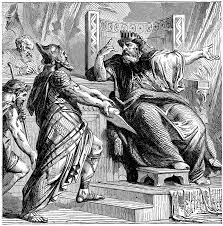By Rabbi Rebecca Lillian, Shir Hazafon: Progressive Judaism in Denmark.

Three dearly important mentors of mine are retiring this year. Each one created, nurtured and led transformative projects. They were teachers and models to a generation of Jewish leaders. It’s hard to imagine those organizations without these individuals at the helm. Yet many Jewish organizations face similar concerns as their founders step down. Avrum Lupin notes in eJewishPhilanthropy that too little is being written about the many challenges faced by the organizations that they leave behind.
This prompted me to look at what our texts teach about succession planning. What NOT to do as well as what TO do can both be learned from the eminent King David.
For example, when David should have been making clear who would succeed him, his offspring were inflicting violence, revenge, and even murder on one another. The tormented king did not intercede even after Adonijah declares himself the heir apparent instead of David’s choice, Solomon.
Thankfully, we need not worry that rival candidates will wage a physical assault or a military coup. But we have heard horror stories about staff changes being marred by power plays, misunderstandings, gossip or—in situations that resemble King David’s difficulty—the existence of a secret inside candidate destined for a particular job.
Once Solomon was ready to ascend to power, though, David did exemplify good succession planning. In only one chapter (22) of Divrei Hayamim Alef (Chronicles 1) we see all of the following:
- Despite his disappointment at not building the Bet Hamikdash (temple), David understood that he had to do a fantastic job of training the inexperienced Solomon to undertake this and other challenging aspects of the kingship.
- David ensured that Solomon would be surrounded by a competent team. It is crucial that anyone leaving a job introduce the successor to their new colleagues. Strong relationships are vital but can be difficult for a newcomer to establish.
- David saw to it that Solomon had the materials needed to build the beit hamikdash or knew how to acquire them. We must remember that our vast store of knowledge will not be second nature to our successors.
- David publicly acknowledged that Solomon was now in power. The entire organization must back the successor of a popular staff member, or the newcomer will face an uphill battle. This is especially vital when the founder of any organization moves on.
Despite King David’s earlier mistakes, he came to understand that true leadership is a responsibility that outlasts any single leader. It comes with the duty to make choices that will help one’s successor to thrive. By providing Solomon with the resources required to complete David’s unfinished project; in helping him network with the people he needed to meet; in letting the people know that authority rested definitively in Solomon–David ultimately brought his reign to a close skillfully and elegantly.
None of us have King David’s power to make or break a kingdom, or even a small Jewish organisation, but we can learn much about succession planning and other aspects of good leadership by studying the stories about him. King David and his teachings thus continue to live on, just as the song David Melech Yisrael promises.
